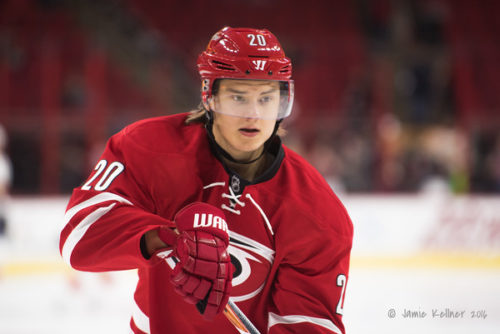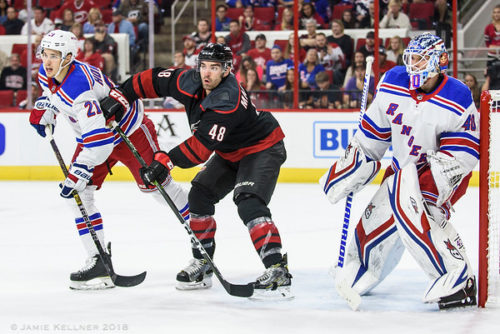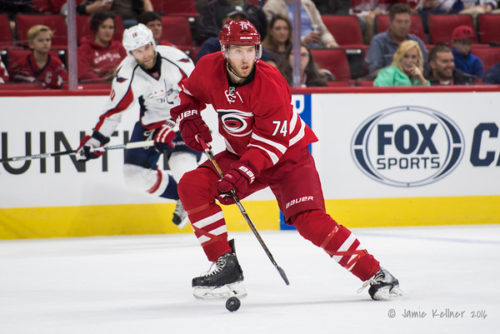No person and his place in fans’ hearts better represents the rollercoaster ride over time as a Carolina Hurricanes fan than former (twice even) head coach Paul Maurice. His status with fans has run the entire range from scapegoat to hero. Perhaps that is because he was a part of so much of it.
Despite being only 30 years old when arriving with the move from Hartford, he already had nearly two full season of NHL head coaching experience when he stepped behind the bench in Greensboro for the 1997-98 season. The team he inherited in Hartford was bad, and he did not manage to do much to change that in his first three years in the head coaching position. But magically in his fourth season in 1998-99, he steered the team to a 12-point improvement, a Southeast Division title and its first playoff berth in North Carolina. After a setback and playoff miss in 1999-00, the team again returned to the playoffs in the 2000-01 season but just like in 1998-99 were ousted in the first round. The team was competitive, but the success that mattered in the playoffs had twice proved elusive.
Along the way Paul Maurice had suddenly established a six-year track record as an NHL coach. And he had also established a brand of hockey that was tight-checking, safe with the puck and seemingly built to grind out 2-1 wins. Maurice’s close to the vest style of play that was heavy on defense, focused on conservative and safe play with the puck and in some people’s estimation light on offense, creativity and entertainment value. Even in the sluggish NHL era that was heavy on trapping defenses and hooking and holding as necessary if that did not work, fans painted the Canes as defense-first often to a fault. The term “dump and chase” was most regularly associated with Maurice’s style of play. The style if you can call it that was characterized by maybe too regularly fighting to win the red line with the puck and then chucking down the ice to one of the offensive zone corners hopefully be chased down and won back.
But all was forgiven and forgotten when lightning struck in the 2001-02 season. The Canes picked up where they left off in winning a playoff spot in 2000-01 and even improved from 88 to 91 points in the standings. This was good enough to win the Southeast Division and set up a rematch with NHL juggernaut New Jersey in the first round. Things started well when the Canes squeaked out two home wins to start the series, but then took a stark turn for the worse. In two games in New Jersey, the Canes were dominated by the Devils who also chased Canes starting goalie Arturs Irbe in both games. Though knotted at 2-2, entering game five the series very much had a negative vibe for Canes fans and the feeling that the Devils might use their momentum to run the Canes the rest of the way out of the series even more quickly than they seemed to climb into it. Facing what felt like a do or die game, Maurice made the somewhat controversial decision to turn to Kevin Weekes in net. He had gained two periods of ice time in game three and looked pretty good in two more periods in game four, but those those were in mop up fashion. Prior to that, he had played exactly two games in the previous month and none in about three weeks. There was some debate about the right course of action on sports talk radio leading up to game five, and the vote was by no means unanimous, but the majority seemed to think that the safest course of action was to come back to Irbe hoping for a rebound back on home ice. Maurice made the decision to instead go with Weekes and it worked. Weekes was outstanding in game five making arguably the greatest save in Canes history in overtime to set the table for a Josef Vasicek game-winner in overtime. Weekes also won game six in New Jersey by a narrow 1-0 margin helping lift the Canes to its first playoff series win and starting the course to a deep playoff run. In those same playoffs, Maurice also made the move to go back to Irbe when Weekes faltered a bit. It is not common for a team to survive one, let alone two, goalie transitions in the playoffs but Maurice pulled it off. And along the way Maurice and the entire team became local heroes uniting Raleigh area sports fans with disparate college sports alliances and leading them through two months of spring and summer hockey that put the Hurricanes on the map in Raleigh. And in the spring and summer of 2002, no one cared what style of hockey the Canes were playing. Winning, especially in the playoffs, was incredibly fun and trumped minutiae like systems and coaching styles.
But it all ended abruptly. With optimism and high expectations from the 2002 playoffs in tow, the Hurricanes stumbled out of the gate in 2002-03, faced some injury setbacks and never did get back on course. After playing in the Stanley Cup Finals only one year earlier, the Canes sank by a whopping 30 points in the standings, finished dead last in their division and lost much of the fan momentum gained from the playoff run. The 2003-04 season offered more of the same and increasingly louder chants of “Mo must go!” during Canes games. Thirty games into the season and tracking toward the bottom of the NHL again, Paul Maurice was fired on December 15, 2003. At this point, he had coached all 6 ½ seasons of the Carolina Hurricanes (plus the two previous in Hartford) and been the only coach the fan base had ever known. In his run with the team (counting only the Hurricanes years), he had 207 wins, 219 losses and 96 ties and overtime losses. He also led the team to its first two Southeast Division titles, three playoff appearances and one magical run to within three wins of the ultimate prize.
But wait, there’s more…
After Maurice left and his successor Peter Laviolette won the Stanley Cup in 2006, Maurice’s days behind the Carolina Hurricanes bench seemed like a distant memory. Had you told a Canes fan in 2006 or 2007 that Maurice would be back behind the bench by 2009, you would have been declared nuts. But this exactly what happened. A combination of injuries, player departures and just subpar play caused a Stanley Cup-winning 2005-06 Hurricanes team to plummet back to Earth just like after the 2002 run. The team missed the playoffs in 2006-07 and again in 2007-08. The misses were not horrible. The team finished with 88 and 92 points respectively in those years. But for a team and management that longed for consistency and regular trips to the playoffs they were disappointing. Following a another mediocre 12-11-2 start to the 2008-09 campaign, Peter Laviolette was relieved of his coaching duties, and Paul Maurice was brought back for a second stint with the team. Sentiment was incredibly mixed, and my sense was that it leaned negative on Maurice’s return. There were various opinions on who the team could or should hire, but the “anyone except Maurice” faction was significant.
But at least short-term the move worked wonders. Maurice made seemingly minor adjustments that gradually tightened up the defense that seemed a bit loose before his arrival. And also gradually, the team started winning. The regular season ended with a Maurice-induced turnaround, a 33-19-5 record after his arrival and a second place divisional finish and spot in the 2009 playoffs. True to history, the Canes again drew the New Jersey Devils who were favored. As an underdog, the Canes rode strong play from Cam Ward in net and timely scoring to an exhilarating game seven road triumph in the last couple minutes to advance to the second round. The Canes were an even bigger underdog in the second round but again pulled out an improbable game seven win in overtime to advance to the Eastern Conference Finals. The two thrilling series wins and the return of the tradition of huge crowds greeting the team at the airport upon return from the road during the playoffs reenergized the fan base. The run ended abruptly when the Pens swept the Canes in the Eastern Conference Finals, but it only slightly dampened what had been an otherwise wonderful playoff experience for Hurricanes hockey fans.
True to form, the Canes followed the playoff success with a flop in the next couple seasons. After subpar third place finishes and playoff misses in 2009-10 and 2010-11, a slow start in 2011-12 spelled a quick end to Maurice’s second run behind the Canes bench. In his second stint, he collected 116 more wins, another playoff appearance and two playoff series wins.
As mathematical context, his 323 wins put Bill Peters 7-8 years away from catching him if he can stick around that long and make it certain that Paul Maurice will be at or near the Canes coaching leader board for at least a couple decades.
For better or for worse, Paul Maurice is a big part of Caniac lore and history, some of it is for a couple great fits of success in the playoffs and some of it is because of inconsistency, disappointment and failure in other years. When you net it out, Maurice’s legacy is very much that of the Carolina Hurricanes in total. It includes a couple incredibly magical years at the peak of anything a team and its fan base could experience, but it also includes lows of frustration and disappointment.



